Forensic Nursing Careers

Forensic nursing is an innovative and fascinating field that combines the expertise of nursing with the intricacies of forensic science. It offers a unique opportunity for healthcare professionals to make a significant impact in the legal system while providing essential care to victims of trauma and abuse. The field has grown exponentially over the past few decades, and with it, the career prospects for forensic nurses have expanded, offering a range of specialized roles and challenging opportunities.
The Rise of Forensic Nursing: A Necessary Fusion

The concept of forensic nursing emerged in the 1990s as a response to the increasing need for specialized care for victims of violence and abuse. Traditional nursing practices often fell short in addressing the complex needs of these individuals, particularly in collecting and preserving evidence for legal proceedings. The field of forensic science, with its focus on analyzing and interpreting physical evidence, provided a natural complement to nursing, leading to the development of forensic nursing as a specialized practice.
Forensic nurses play a pivotal role in the criminal justice system, often serving as the bridge between healthcare and law enforcement. They are trained to assess and treat patients who have experienced trauma or abuse, while also collecting and documenting forensic evidence in a way that can be used in court. This dual role requires a unique set of skills and knowledge, making forensic nursing a highly specialized and in-demand profession.
Educational Pathways and Certifications

Aspiring forensic nurses typically begin their journey with a strong foundation in nursing education. Most positions require at least a Bachelor of Science in Nursing (BSN) degree, although some advanced roles may prefer or require a Master of Science in Nursing (MSN) or even a doctoral degree. The educational path often includes specialized courses in forensic science, criminology, and legal aspects of healthcare.
Beyond the academic requirements, certification plays a crucial role in forensic nursing. The International Association of Forensic Nurses (IAFN) offers the Sexual Assault Nurse Examiner (SANE) certification, which is widely recognized and respected in the field. SANE nurses undergo rigorous training to become experts in the medical and legal aspects of sexual assault cases. Additionally, forensic nurses may pursue certifications in areas such as death investigation, child abuse, and forensic mental health, further enhancing their expertise and career prospects.
| Certification | Specialization |
|---|---|
| Sexual Assault Nurse Examiner (SANE) | Sexual Assault Examination and Investigation |
| Forensic Nurse Investigator (FNI) | Crime Scene Investigation and Evidence Collection |
| Forensic Clinical Nurse Specialist (FCNS) | Advanced Practice in Forensic Nursing |

Career Paths and Opportunities
The career landscape for forensic nurses is diverse and ever-evolving. While the majority of forensic nurses work in hospital settings, particularly in emergency departments and sexual assault treatment centers, there are numerous other avenues for professional growth.
Hospital-Based Forensic Nursing
Hospital forensic nurses are often the first point of contact for victims of trauma or abuse. They provide comprehensive medical care, conduct forensic examinations, and offer emotional support to patients. These nurses work closely with law enforcement and legal professionals to ensure the proper collection and documentation of evidence. They may also testify in court, providing expert testimony on the medical and forensic aspects of a case.
Forensic Nurse Examiner
Forensic nurse examiners (FNE) are specialized professionals who conduct comprehensive forensic examinations on victims of sexual assault, domestic violence, or child abuse. They work in dedicated forensic centers or clinics, where they provide a safe and supportive environment for patients. FNE roles often involve a high level of autonomy and require strong critical thinking and decision-making skills.
Forensic Nurse Consultant
Forensic nurse consultants offer their expertise to a variety of organizations, including law enforcement agencies, legal firms, and healthcare institutions. They may provide training and education on forensic nursing practices, assist in developing protocols and policies, or offer expert testimony in court cases. This role allows for a great deal of flexibility and often involves working on a contract basis.
Forensic Clinical Nurse Specialist
Forensic clinical nurse specialists (FCNS) are advanced practice nurses who provide specialized care and consultation in forensic settings. They often work in correctional facilities, psychiatric hospitals, or long-term care facilities, where they assess and treat patients with complex medical and forensic needs. FCNS roles require a high level of clinical expertise and often involve a significant amount of research and academic engagement.
Forensic Nurse Researcher
Forensic nurse researchers play a crucial role in advancing the field of forensic nursing through research and innovation. They conduct studies, analyze data, and publish their findings in academic journals. Their work contributes to the development of best practices, evidence-based protocols, and new technologies in forensic nursing. This role often requires a doctoral degree and a strong background in research methodologies.
The Impact of Forensic Nursing: A Look at Real-World Cases
Forensic nursing has had a profound impact on the lives of victims and the course of justice. Let’s consider a real-world case where a forensic nurse’s expertise made a significant difference.
A 28-year-old woman presents to the emergency department, alleging that she was sexually assaulted by an unknown assailant. The patient is visibly distressed and hesitant to speak about the incident. A forensic nurse, trained in trauma-informed care, approaches the patient with empathy and sensitivity. The nurse conducts a thorough forensic examination, collecting and documenting evidence while providing emotional support to the patient.
The nurse's expertise in forensic nursing enables them to recognize subtle signs of trauma and abuse. They identify and document injuries that may not be immediately apparent, such as bruising or lacerations. The nurse also collects biological samples, such as DNA evidence, which can be crucial in identifying the perpetrator. Throughout the process, the nurse ensures the patient's comfort and confidentiality, fostering a sense of trust and safety.
The evidence collected by the forensic nurse plays a critical role in the subsequent legal proceedings. It provides a solid foundation for the prosecution's case, leading to the arrest and conviction of the perpetrator. The nurse's testimony in court, based on their expert knowledge and experience, further strengthens the case, ensuring justice is served.
The Future of Forensic Nursing: Emerging Trends and Challenges

As the field of forensic nursing continues to evolve, several emerging trends and challenges are shaping its future.
Technology and Innovation
Advancements in technology are revolutionizing forensic nursing practices. Digital documentation systems, for instance, allow for more efficient and secure record-keeping of forensic examinations. Telehealth services are also becoming increasingly common, enabling forensic nurses to provide remote consultations and support to patients in remote or underserved areas.
Additionally, the development of advanced DNA testing and analysis techniques is enhancing the accuracy and speed of forensic investigations. These technological innovations are not only improving the quality of forensic nursing care but also expanding the reach and impact of the field.
Addressing Mental Health and Trauma
Forensic nurses are increasingly recognizing the importance of addressing the mental health needs of victims. The trauma experienced by victims of violence and abuse can have long-lasting effects on their mental well-being. As such, forensic nurses are integrating mental health assessments and interventions into their practice, providing holistic care that addresses both physical and psychological needs.
Interdisciplinary Collaboration
The success of forensic nursing often relies on effective collaboration with other professionals, including law enforcement officers, social workers, and legal experts. As the field evolves, there is a growing emphasis on fostering strong interdisciplinary relationships. This collaborative approach ensures that victims receive comprehensive care and that evidence is collected and handled in a manner that meets the highest legal standards.
Ethical Considerations
Forensic nursing, by its nature, raises complex ethical considerations. Nurses must navigate delicate issues such as patient confidentiality, informed consent, and the potential conflict between patient advocacy and the legal system. As the field advances, ongoing education and discussion on ethical practices are essential to ensure that forensic nurses can make informed and ethical decisions in their practice.
What are the key skills required for a career in forensic nursing?
+Forensic nurses require a unique set of skills, including strong clinical nursing abilities, attention to detail, critical thinking, and excellent communication skills. They must also be adept at working with vulnerable populations and have a solid understanding of the legal system and its processes.
How can I gain experience in forensic nursing if I’m just starting out?
+Many forensic nurses start by gaining experience in traditional nursing roles, such as emergency department nursing or psychiatric nursing. You can also seek out volunteer opportunities with organizations that support victims of trauma or abuse. Additionally, pursuing certifications and attending conferences can provide valuable networking and learning opportunities.
What are the potential challenges of working in forensic nursing?
+Forensic nursing can be emotionally demanding, as nurses often work with victims of trauma and abuse. It requires a high level of emotional intelligence and resilience. Additionally, forensic nurses may face challenges related to evidence collection and preservation, as well as navigating the complexities of the legal system.



